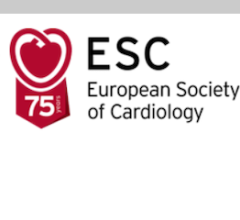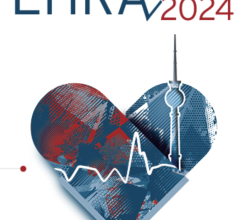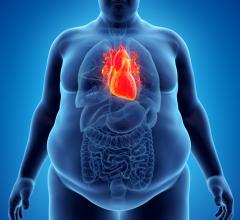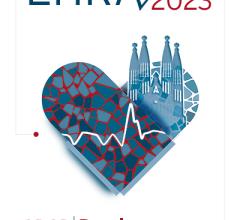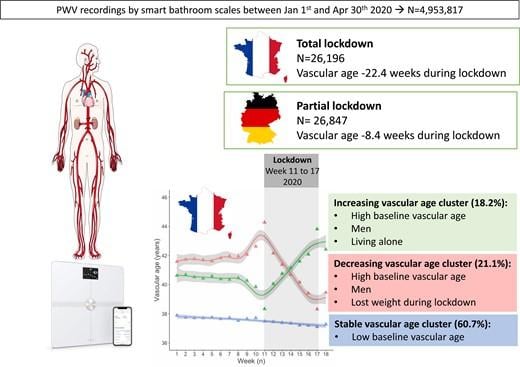
Graphical abstract During COVID19 total lockdown in 2020 in France, a significant reduction in vascular stiffness, recorded by home smart scales, was observed.© The Author(s) 2022. Published by Oxford University Press on behalf of the European Society o f Cardiology.This is an Open Access article distributed under the terms of the Creative Commons Attribution-NonCommercial License (https://creativecommons.org/licenses/by-nc/4.0/), which permits non-commercial re-use, distribution, and reproduction in any medium, provided the original work is properly cited. For commercial re-use, please contact [email protected]© The Author(s) 2022. Published by Oxford University Press on behalf of the European Society of Cardiology.
September 7, 2022 — A new paper in European Heart Journal - Digital Health, published by Oxford University Press, indicates that social-distancing measures like total lockdown have a measurable impact on vascular health. The study compared the impact on the health of people living in a partial vs. a total lockdown during the beginning of COVID-19.
Nationwide total home confinement, lockdown, was the most striking measure taken to prevent the spread of COVID-19 infection. Previous research has demonstrated that total lockdown resulted in a 54% reduction in physical activity. This, together with anxiety, financial stress, and difficulty securing appointments with doctors, might have hurt cardiovascular health. Lockdowns do, however, have some beneficial effects on cardiovascular health. The social distancing guidelines imposed on people around the world resulted in a reduction in air pollution and increased home cooking. People reduced their consumption of fast food and ready-made meals. People had less work-related stress and slept better. Lockdown has been applied heterogeneously by different countries, providing a unique opportunity to compare the impact of different social-distancing measures on cardiovascular health in a real-life experiment with a large population sample.
Researchers here compared the cardiovascular health of people in France, which imposed strict limitations on peoples’ movements, including the shutdown of all non-essential production and commercial activities, to that of people in Germany, which adopted much less stringent social-distancing measures.
Researchers here selected 53,043 people in France and Germany and tracked their health during the spring of 2020 when France’s lockdown began. Some 21.1% of French patients tracked during lockdown showed an overall improvement in cardiovascular health, with a reduction in vascular stiffness and body weight despite a concomitant reduction in physical activity. In France, the improvement in vascular age during lockdown corresponded to a reduction in vascular age of more than three years.
The phenomenon was only modestly present in Germany, where lockdown was partial. The reduction in vascular stiffness was significantly steeper in French patients than in Germans. Vascular age reduction during lockdown was steeper in French than in German participants. French participants also showed a slight but greater weight reduction during lockdown than German participants.
For more information: https://academic.oup.com/
Related COVID Content:
Myocarditis Risk Significantly Higher After COVID-19 Infection vs. After a COVID-19 Vaccine
COVID-19 Fallout May Lead to More Cancer Deaths
Kawasaki-like Inflammatory Disease Affects Children With COVID-19
FDA Adds Myocarditis Warning to COVID mRNA Vaccine Clinician Fact Sheets
CMS Now Requires COVID-19 Vaccinations for Healthcare Workers by January 4
Cardiac MRI of Myocarditis After COVID-19 Vaccination in Adolescents
Small Number of Patients Have Myocarditis-like Illness After COVID-19 Vaccination
Overview of Myocarditis Cases Caused by the COVID-19 Vaccine
Case Study Describes One of the First U.S. Cases of MIS-C
NIH-funded Project Wants to Identify Children at Risk for MIS-C From COVID-19


 August 29, 2025
August 29, 2025 
